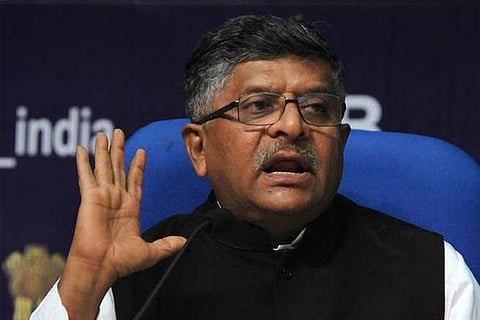

New Delhi
Facebook-owned instant messenger WhatsApp, in a petition in Delhi High Court, said that enabling identification of the first originator of information on its platform in India puts end-to-end encryption and its benefits at risk, as it urged the court to pass direction to declare this requirement ultra vires the IT Act.
"The Government of India is committed to ensure the Right of Privacy to all its citizens but at the same time it is also the responsibility of the government to maintain law and order and ensure national security," an official statement quoted the IT Minister Prasad as saying.
The statement said that the government respects the right of privacy and has no intention to violate it when WhatsApp is required to disclose the origin of a particular message.
It however, added that as per all established judicial dictum, no fundamental right, including the right to privacy, is absolute and it is subject to reasonable restrictions.
"The requirements in the Intermediary Guidelines pertaining to the first originator of information are an example of such a reasonable restriction," it said.
Such requirements are only in case when the message is required for prevention, investigation or punishment of "very serious offences" related to the sovereignty and integrity of India, the security of the State, friendly relations with foreign states, or public order, or of incitement to an offence relating to the above or in relation with rape, sexually explicit material or child sexual abuse material, it said.
Moreover, such information can only be sought as per a process sanctioned by the law thereby incorporating sufficient legal safeguards.
Prasad also assured that none of the measures proposed by India will impact the normal functioning of WhatsApp in any manner whatsoever and for the common users, there will be no impact.
The minister noted that it is in public interest that who started the mischief leading to such crime must be detected and punished.
"We cannot deny as to how in cases of mob lynching and riots etc. repeated WhatsApp messages are circulated and recirculated whose content are already in public domain. Hence the role of who originated is very important," it added.
The minister also said: "The entire debate on whether encryption would be maintained or not is misplaced. Whether Right to Privacy is ensured through using encryption technology or some other technology is entirely the purview of the social media intermediary."
Prasad added that the Government of India is committed to ensuring Right of Privacy to all its citizens as well as have the means and the information necessary to ensure public order and maintain national security. It is WhatsApp's responsibility to find a technical solution, whether through encryption or otherwise, that both happen, he said.
"As a significant social media intermediary, WhatsApp seeks a safe harbour protection as per the provisions of the Information Technology Act. However, in a befuddling act, they seek to avoid responsibility and refuse to enact the very steps which permit them a safe harbour provision," he said.
The minister who also holds the law portfolio said that the rules enacted by Indian government are not rules enacted in isolation but have global precedence.
In July 2019, the governments of the United Kingdom, United States, Australia, New Zealand and Canada issued a communique, concluding that: "tech companies should include mechanisms in the design of their encrypted products and services whereby governments, acting with appropriate legal authority, can gain access to data in a readable and usable format."
Further, he noted that Brazilian law enforcement is looking for WhatsApp to provide suspects' IP addresses, customer information, geo-location data and physical messages.'
"What India is asking for is significantly much less than what some of the other countries have demanded."
Therefore, he said that WhatsApp's attempt to portray the Intermediary Guidelines of India as contrary to the right to privacy is misguided.
On the contrary in India, privacy is a fundamental right subject to reasonable restrictions, Prasad said, adding that Rule 4(2) of the Guidelines is an example of such a reasonable restriction.
It would be foolhardy to doubt the objective behind Rule 4(2) of the Intermediary Guidelines, which aims to protect law and order.
Visit news.dtnext.in to explore our interactive epaper!
Download the DT Next app for more exciting features!
Click here for iOS
Click here for Android